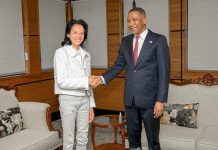Africa-Press – Botswana. The World Bank will disburse US$12 billion over the next 15 months to help countries respond to the food security crisis, with nearly US$7 billion earmarked for Africa and the Middle East.
“The World Bank works with countries to prepare several projects, worth US$12 billion, over the next 15 months, to respond to the food insecurity crisis”, reads the “International Financial Institutions Action Plan to Dealing with Food Insecurity”, consulted yesterday by Lusa.
The plan shared by the multilateral financial institutions has six main objectives: supporting vulnerable populations, promoting open trade, mitigating fertilizer shortages, supporting food production now, investing in climate-resilient agriculture for the future and focusing on coordination to maximize the impact.
The projects are not yet finalized, “but they will include support for agriculture ($5.2 billion), social protection to accommodate the impact on incomes due to rising food prices ($3.3 billion) and of water and irrigation (US$2 billion)”, says the document, which summarizes the main actions of each of the six multilateral banks participating in this joint effort.
Most of this US$12 billion budget goes to Africa and the Middle East, which receive a total of US$6.9 billion, followed by Europe and Central Asia (US$1.9 billion) and Southern Asia. (USD 2.4 billion).
In addition to these funds, the World Bank still has 18.7 billion dollars that have not yet been disbursed, within the scope of support for development projects all over the world, of which 15 billion dollars are for Africa, which, in total, they should be increased to 30 billion dollars.
“This response will be anchored in all the Bank’s financing instruments, including the financing of specific investments, disbursements against results, and support for development policies”, indicates the financial institution.
In this plan, multilateral financial institutions detail ongoing climate resilience support programs and present examples of initiatives to mitigate the food crisis arising from the war between Russia and Ukraine.
“International financial institutions” have a solid track record and already make significant financial and technical contributions to the global food security architecture, which also includes bilateral donors, United Nations food and agriculture agencies, sector-specific intermediary funds, and philanthropic organizations, among other important actors”, the Plan also reads.
For More News And Analysis About Botswana Follow Africa-Press






